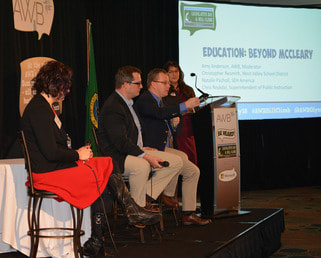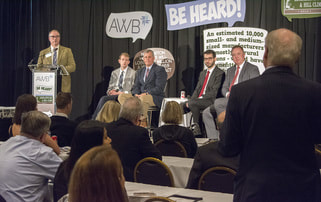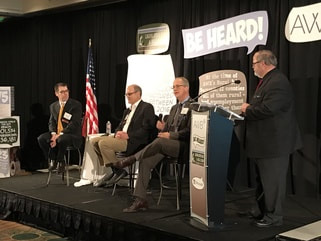 Stephanie Swanberg, Government & Regional Affairs Manager Stephanie Swanberg, Government & Regional Affairs Manager The Association of Washington Business (AWB) hosted their annual Legislative Day and Hill Climb last week. As the session accelerates, businesses from all over the state met to discuss, prioritize, and reach out to legislators in hopes of creating and promoting a business-friendly agenda. While the topics of discussion and speaker opinions varied widely, the overall theme was embraced by all: to attract and help businesses thrive in Washington state. The following is a summary of discussion highlights from three of the panels, including: Workforce Development, Manufacturing, and Climate. One of AWB’s hot topics is workforce development. The panel included the State Superintendent, Chris Reykdal, Natalie Pacholl with SEH, and Chris Nesmith, West Valley School District CTE Director. The panel was in agreement that the need to develop a workforce is a high priority. Reykdal referred to last year’s agreement, addressing the Supreme Court’s McCleary ruling: “…now let’s really shape up the system so that our students are prepared much earlier to explore career… we will get significant productivity yield if we will stop the idea of every student turning 22 years old before they get serious about career.” Natalie Pacholl expressed concern that high tech manufacturing jobs are hard to fill. The partnerships with community colleges is strong, but the K-12 system is lagging. Pacholl described a partnership SEH created with Evergreen Public Schools to be proactive about helping kids graduate with the skills and education they need to get a good job. Parents need to be better informed about the employment marketplace and understand the “other” four-year degree. Nesmith explained that schools can reach out to businesses as mentors and sponsors to start pilot programs and offer internships and other training. “All you need is vision” he said. Manufacturing panelists were asked, “What is your biggest challenge?” Interestingly, they all had a similar answer: finding qualified workers. David Rankin, of Rankin Equipment, responded that he deals with “getting qualified workers to pass the drug test.” Tracie Wilson, of DeWills Industries lamented that his issue was the same: getting employees to show up and pass the drug test. He also said the average factory wage at his company is $50,000 to $60,000 a year, yet, a lack of qualified workers has hindered growth, "…so, these are good paying factory jobs, under good working conditions, and we still cannot get enough people.” Michael Senske, of Pearson Packaging, told the audience that their company struggles to find a steady stream of candidates with advanced system skills, and indicated that Pearson no longer requires employees to submit to drug testing. The panelists discussed that not all students are matched with getting a four-year college degree, and could succeed with better vocational training. Each company supported workforce development through internships, mentoring, partnerships or specific programs – such as welding. Only Pearson Packaging requires a High School diploma for employment and all the companies provided on the job training. These businesses agree that immigration policies are critical to maintain their workforce. They were all asked what they would do if they were governor for one day. Their answer was insightful: reform L&I.
Washington lawmakers tackled the carbon issue with differing views. The panelists included House Environment Committee Chair Joe Fitzgibbon (D-Burien), Sen. Doug Ericksen (R-Ferndale), Rep. Richard DeBolt (R-Chehalis) and Reed Schuler, a senior climate advisor to the governor. They all agreed on one thing: they would prefer addressing the issue in Olympia rather than through an initiative. Fitzgibbon and Schuler agreed that carbon reduction requires urgent action and preferred a carbon tax statewide because it is easier to manage and creates certainty over cap and trade, which they said would work better as a global reduction solution. Erickson and DeBolt agreed that innovation and incentives are better than a tax or cap and trade. DeBolt described legislation he is working on that would make changes to the state Renewable Portfolio Standard that would count hydropower as green power, and offers a business and occupation tax credit for businesses that reduce their carbon footprint. Ericksen said transportation remains the largest source of carbon emissions and he doesn’t believe raising taxes is the way to solve that problem, calling it a “regressive hit” to families. We should be investing in technology and research and development to develop the next generation transportation, he said. As a first-timer, the Q&A was my favorite part about each of the panels. This is where we get to the heart of the matter. Policies made in Olympia affect real people with real businesses. Their experiences, challenges, obstacles and efforts to succeed inspire us to act. Here at the Tri-City Regional Chamber of Commerce, the AWB Legislative Day strengthened our resolve to create a strong and sustainable business environment that promotes investment, innovation, job growth, education/workforce development and economic growth.
0 Comments
Leave a Reply. |
Categories
All
Archives
July 2024
|
|
Copyright © Tri-City Regional Chamber of Commerce. All rights reserved.
7130 W Grandridge Blvd., Suite C, Kennewick, WA 99336 USA Phone: (509) 736-0510 [email protected] |
Hours
Monday - Thursday: 8 am - 5 pm (closed for lunch 12 - 1 pm) Friday: 8 am - 12 pm Closed Weekends |




 RSS Feed
RSS Feed